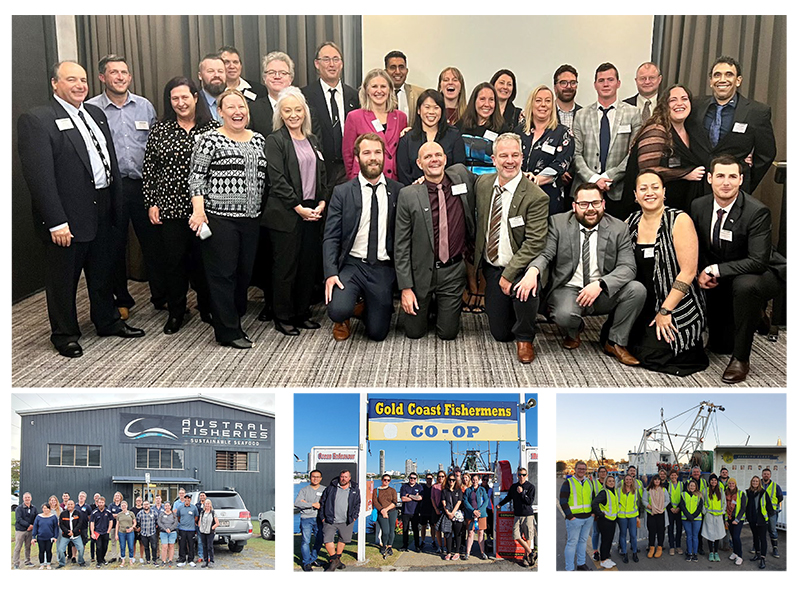The National Seafood Industry Leadership Program (NSILP) celebrates its 24th year in 2023, with two new intakes set to take graduate numbers to more than 350.
The first National Seafood Industry Leadership Program for 2023 kicks off in March, and applications for the online course to begin in May, are open now.
NSILP, which launched in 2009, already has more than 300 graduates, with many taking on leadership roles across the seafood sector after building their skills and confidence.
NSILP is funded by the FRDC, with sponsorship from Austral Fisheries, and is delivered by leadership training company Affectus. It is the only national seafood industry-specific leadership program in Australia.
It aims to develop skill and capacity at a personal, business and national level.
Since 2018, the program has run two courses each year and, as of 2022, one of these is run online, opening the program to a broader range of people across the industry, who may not necessarily be able to travel for the in-person course.
“We’re also very determined to involve alumni as much as possible,” says Jill Briggs, Managing Director of Affectus. “Many of the alumni are now in significant leadership roles within the industry and, even though we bring in others, there’s a real sense from the alumni that they want to reconnect with us.”

A diverse experience
NSILP Program Manager Dr Heidi Mumme says the diversity of the program’s participants is a crucial feature.
“The beauty of this program is that we encompass all areas of the industry. A lot of people work within their particular niche of the industry and never really get an understanding of the other sectors,” Heidi says.
“The program brings in a diverse range of industry people including Indigenous and traditional fishers, commercial fishers, recreational fishers, aquaculture, people working in supply chains, government researchers and so on. It’s unique in that regard, getting all those people in one room together to complete a program.
Building capability and capacity
Sally Roberts, FRDC Capability, Capacity and Culture Manager, says the NSILP program is foundational in FRDC’s commitment to building capacity through connecting people and developing and nurturing leadership in fishing and aquaculture.
“Our R&D plan has an enabling strategy around developing capability and capacity, and leadership is a key element in that. It’s important that people can lead in their own way and access different opportunities, like NSILP, to develop and connect with people across fishing and aquaculture. There is always a role for leadership, no matter what your title or position is.”
“NSILP is also about bringing people together so they can build a broader understanding of fishing and aquaculture. The alumni are a valued, well-connected and diverse network of active leaders. They’re involved in NSILP via mentoring, residentials and supporting new participants to apply for the program.”
Sally also notes that the partnership with Affectus, as well as the sponsorship from Austral Fisheries, is a critical element of running a successful program.
“FRDC is committed to investing in people and supporting leadership development in collaboration with our partners. We’re interested in trying new approaches, such as the online NSILP program, to explore a range of ways that people can learn, challenge and develop themselves.”
Alumni reflect on their experience
Gemma Gwilliams
ESG and Communities Partner, Tassal
Gemma participated in the first fully online NSILP from July-December 2022
“My workplace, Tassal, offered me the option to apply. We’ve had quite a few people from here participate in the program over the last 10 years or so, and they have all done really well and stepped up in their areas. So, I thought it was a really good opportunity.
“I’m normally one of the quietest people in the room, so going through the program gave me the tools and confidence to speak up and share ideas. It also helped me to encourage others to participate and lead different teams to execute strategies and goals that have been set for different programs or initiatives.
“The networking was also really beneficial. Not only working with people that were within my cohort, but the people we met along the way from aquaculture and fisheries from Australia and New Zealand. We were able to learn what the common challenges were, and open connections to share information. I also gained a really helpful mentor from New Zealand.
Delahay Miller
Senior Policy Manager, Indigenous Land and Sea Corporation, Australian Government
Delahay participated in NSILP in 2020, with the first session in-person, and the last two sessions online due to COVID-19.
“I am a Traditional Owner, and our mob are coastal people, so we have a cultural connection, responsibility, and obligation to sea country. That’s been a fundamental base to my career working in the fishing sector.
“I now work at the Commonwealth Government at the Indigenous Land and Sea Corporation, where our aim is to assist Indigenous people with the acquisition and management of land, salt water and fresh water so they can achieve economic, environmental, social and cultural benefits. I also sit on the South Australian Research Advisory Committee and am involved in a number of national FRDC projects at the moment.
“The biggest takeaway from NSILP, as I’m sure plenty of participants will say, is that we connect widely, and build a great network throughout the whole program. The other big takeaway is that it is a time to reflect on yourself as a person, which allows you to notice subtle things about yourself and grow as an individual.
“I use the skills from the program every single day. I manage people and I am regularly in contact with people from the seafood industry. A part of my role is the development of policies and strategies. So, the whole vision, mission and strategy aspect of the program really resonates with my current role, but nearly all parts of the program continue to be relevant.
“I would like to encourage Indigenous fishers to take the lead and get involved.”
This relates to R&D Plan Outcome 5





